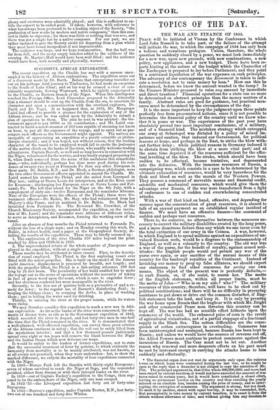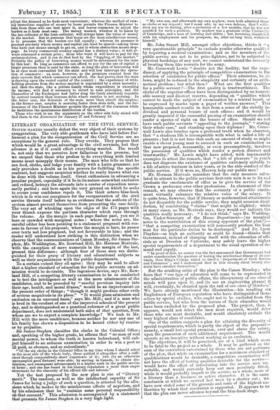TOPICS OF THE DAY.
THE WAR AND FINANCE OF 1855.
PEACE will be initiated at Vienna by the Conference in which Lord John Russell is to take part, or the failure of the attempt will initiate the war, to which the campaign of 1854 has only been a tedious and vexatious prologue. -Unless, therefore, the whole question be suddenly closed by a peace, we must look immediately for a new war, upon new grounds, with new combinations, a new policy, new appliances, and a new budget. There have been re- ports hinting at the nature of the budget which the Chancellor of the Exchequer is prepared to lay before Parliament, and they point to a continued liquidation of the war expenses on cash principles. The advocacy of our contemporary the Economist is taken to indi- cate a resolution not to raise money by loan. ° How can this be determined, before we know the amount wanted in the lump ? Is the Finance Minister prepared to raise any amount by immediate and direct taxation ? Financial operations for a state can no more be determined on abstract principles than the money matters of a family. Abstract rides are good for guidance, but practical mea- sures must be determined by the circumstanoes of the day.
It is the more important to keep the judgment upon these points perfectly free from preconceived notions, since it is not possible to determine the financial policy of the country until we know whe- ther it is peace or war. The experiences of the past year have absolutely proved two most important conclusions, of a military, and of a financial kind. The mistaken strategy which entrapped our army at Sebastopol was dictated by a polioy of mixed im- patience and caution, that induced our Government, for political reasons at home, and perhaps in the East, to strike the blow with- out further delay ; while political reasons in Germany induced it to abstain from striking the blow at a more vital part' and at the same time deprived it of the resources sufficient for the effec- tual levelling of the blow. The stroke, which should have been sudden to be effectual, became tentative, and degenerated into the defensive. With the immense resources of Russia, a campaigning war, which consists in a race to be determined by the ultimate exhaustion of resources, would be very hazardous for the flesh and blood as well as the morale of the Western Powers. They possess a command of moveable means and financial credit, scientific and mechanical resources, which would give them the advantage over Russia, if the war were transformed from a fight of endurance to one of sudden and overwhelming concentrated attacks.
I With a war of that kind on hand, offensive, and depending for I success upon the concentration of great resources, it is absurd to talk of an annual payment as an established regular incident of finance. We must have an offensive finance—the command of sudden and perhaps vast resources. There is, we conceive, no alternative between the 'measures ne- cessary to correct the military disabilities created by the long peace, and a more disastrous failure than any which we can incur even by the total extinction of our army in the Crimea. A war, however, in which England is to spend millions against an expenditure of un- yoked Russian serfs, would be a disgrace to the statesmanship of England, as well as a calamity to the country. The old war was a war of the purse, for the benefit of royalty, against armed mul- titudes: the English people would not permit any war of the purse over again, or any sacrifice of the annual means of this country for the bankrupt royalties of the Continent. Instead of lavishing our money to prop up false alliances, we should expect our statesmen to find other resources for saving our own means. The object of the present war is perfectly definite,— to curb Russia, or, if she resist, to coerce her. The motto of the English statesman, within all proper limits, must be the motto of Iehu—" Who is on my side ? who ? " The military resources of this country, therefore, will have to be eked out by political combinations ; and there will be no difficulty in procuring assistance to put down or drive out the common disturber, if Eng- lish statesmen take the lead, and keep it. It is only by pressing the war home upon Russia that the bugbear with which Mr. Bright and other commercial Peace men threaten this country can be kept off. The war has had no sensible effect hitherto upon the commerce of the world. The enhanced price of corn is the result
of agricultural vicissitudes, not of a partial stoppage of a fractional supply in the Black Sea. The cotton difficulties are the conse- quence of cotton extravagance in overtrading. Commerce has been uninterrupted and unstayed, because Russia has been kept to Russia ; and unless we would have the sources of revenue cut off,
the Allied Powers must continue to protect commerce against the incursions of Russia. The Czar must not be let out. Another reason why renewed and more desperate efforts on his part must be met by increased energy in ,carrying the attacks home to him suddenly and effectually.
• The financial organ does not rest its arguments only upon the ruinous terms on which loans were contracted during the last war, or he might be open to the reply that a financier is not obliged to copy the mistakes of Mr. Pitt. The principal argument is, that if the whole 600,000,0001. and more had been raised by current taxation, it would not have exceeded the amount of war taxes raised in certain years, but it would have constituted a closed effort, leaving no permanent burden on the country and thus entailing the yearly interest as an absolute loss, besides raising the price of money, and so inter- rupting the enterprise of commerce. The argument is strong, but not final. To meet it by another, stated with equal brevity, it may be contended, first, that peremptorily to take money by current taxation, is to exact it from the citizen without allowance of time, and without giving him any freedom to
adjust the demand as he finds most convenient; whereas the method of rais- ing immediate supplies of money by loans permits the Finance minister to take from those who can best spare it, and leaves commerce to adjust the burden as it finds moat easy. The money wanted, whether it be taken by the tax-oollector or the loan-calleotor, willatways raise the value of money in the market. But to presume that taxes are the least-mischievous means, is to presume that the burden can fall equally ; whereas its pressure is greatest precisely where money and capital can least be spared—among those who have just means enough to get on, and to whom abstraction means stop- page. In every commercial country capital has a distinct value ; it will al- ways command a certain price ; those who want it will have to pay for the accommodation, and it can do that best by the " higgling of the market." Probably the policy of borrowing money would be determined for the state by this test: So long as commerce can afford to pay for the use of capital a larger premium than is paid by the state, so long the plan of borrowing will be at once most convenient for the state and will less interrupt the opera- tion of commerce : as soon, however, as the premium exacted from the state exceeds that which commerce can afford, the fact proves that the state is drawing upon the vested capital of the country ; the expediency of with- holding pressure from the money-market is superseded by a stern necessity ; and then the state, like a private family whose expenditure is exceeding its income, will find it necessary to revert to eash principles, and the Chancellor of the Exchequer had better drag the funds absolutely requisite by current taxation than increase debts where surplus is not accruing. In the latter case, the demands of the state more than absorb the surplus; in the former case, surplus is accruing faster than state debt, and the for- bearance of the Finance Minister permits the growth of the resources while he facilitates the spontaneous distribution of the burden. Those who wish to see the arguments on the other side fully stated will find them in the Economist for January 27 and February 10.



























 Previous page
Previous page